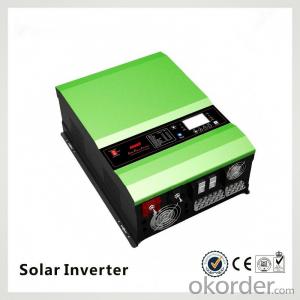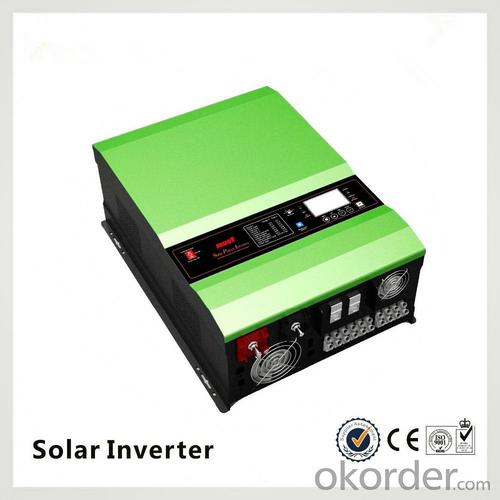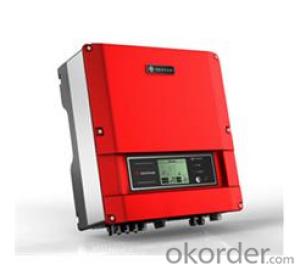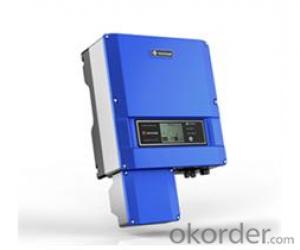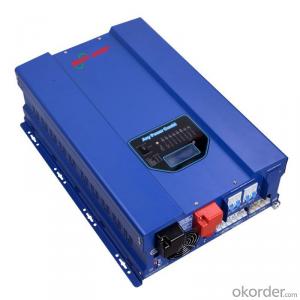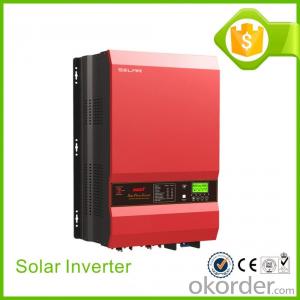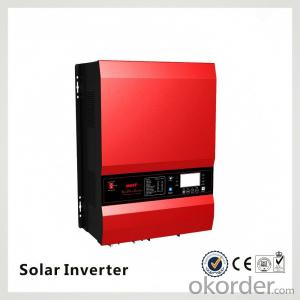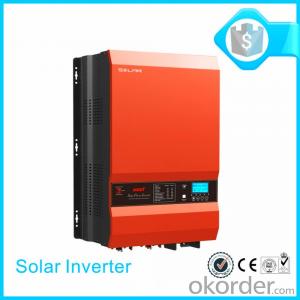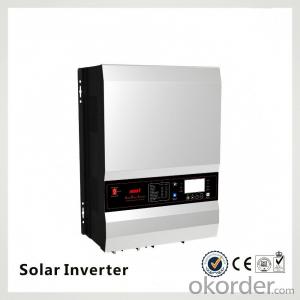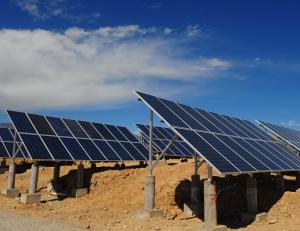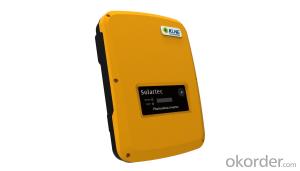Ecoflow 800 Watt Off-Grid Hybrid Solar Power Inverter 1000 2000 3000 4000 5000VA
- Loading Port:
- Shanghai
- Payment Terms:
- TT OR LC
- Min Order Qty:
- 10000 watt
- Supply Capability:
- 100000 watt/month
OKorder Service Pledge
OKorder Financial Service
You Might Also Like
Product Description
What is Solar inverter?
Solar pv inverters is an electronic system that operates the photovoltaic(PV) modules in a manner that allows the modules to produce all the power they are capable of. The solar mate charge controller is a microprocessor-based system designed to implement the MPPT. It can increase charge current up to 30% or more compared to traditional charge controllers.
Features
. Pure sine wave inverter
. Selectable input voltage range for home appliances and personal computers
. Selectable charging current based on applications
. Configurable AC/Solar input priority via LCD setting
. Compatible to mains voltage or generator power
. Parallel operation with up to 6 units only available for PV1800 4KVA/5KVA
. Auto restart while AC is recovering
. Overload and short circuit protection
. Smart battery charger design for optimized battery performance
. Cold start function
Specification
RATED POWER | 1000VA / 800W | 2000VA/ | 3000VA / 2400W | 4000VA / 3200W | 5000VA / 4000W | |||||
INPUT | ||||||||||
Voltage | 230 VAC | |||||||||
Selectable Voltage Range | 170-280 VAC (For Personal Computers) ; 90-280 VAC (For Home Appliances) | |||||||||
Frequency Range | 50 Hz/60 Hz (Auto sensing) | |||||||||
OUTPUT | ||||||||||
AC Voltage Regulation | 230 VAC ± 5% | |||||||||
Surge Power | 2000VA | 4000VA | 6000VA | 8000VA | 10000VA | |||||
Efficiency (Peak) | 90% | 93% | ||||||||
Transfer Time | 10 ms (For Personal Computers) ; 20 ms (For Home Appliances) | |||||||||
Waveform | Pure sine wave | |||||||||
BATTERY | ||||||||||
Battery Voltage | 12 VDC | 24 VDC | 48 VDC | |||||||
Floating Charge Voltage | 13.5 VDC | 27 VDC | 54 VDC | |||||||
Overcharge Protection | 15 VDC | 30 VDC | 60 VDC | |||||||
Maximum Charge Current | 10 A or 20 A | 20 A or 30 A | 60 A | |||||||
SOLAR CHARGER (OPTION) | ||||||||||
Charging Current | 50 A | |||||||||
Maximum PV Array Open Circuit Voltage | 30 VDC | 60 VDC | 105 VDC | |||||||
Standby power Consumption | 1 W | 2 W | 2 W | |||||||
PHYSICAL | ||||||||||
Dimension, D x W x H (mm) | 95 x 240 x 316 | 100 x 272 x 355 | 125 x 297.5 x 468 | |||||||
Net Weight (kgs) | 5.0 | 6.4 | 6.9 | 9.8 | 9.8 | |||||
OPERATING ENVIRONMENT | ||||||||||
Humidity | 5% to 95% Relative Humidity(Non-condensing) | |||||||||
Operating Temperature | 0°C - 55°C | |||||||||
Storage Temperature | -15°C - 60°C | |||||||||
Images
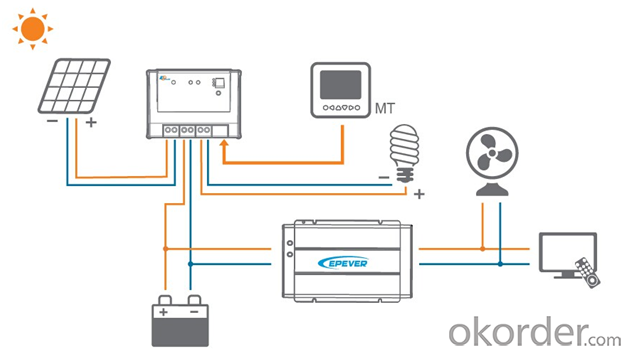
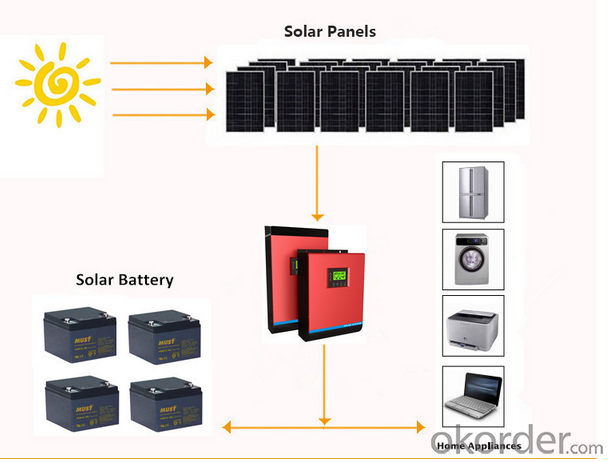
Packaging & Shipping
What is the packing?
1.Package: Carton Box for packaging, or Wooden Box advised for Samples to protect in transportations. Package designed by Clients is welcomed.
2.Shipping: DHL,FEDEX,UPS,EMS,AirWay and By Sea.
3.Payment: T/T( telegraphic transfer (T/T) and Western Union
4.Welcome to your Sample Order to test First.
FAQ
Q1: How to choose a right inverter?
A1:Tell us your demand, then our sales will recommend a suitable inverter to you.
Q2: What's the different between inverter and solar inverter?
A2: Inverter is only accept AC input, but solar inverter not only accept AC input but also can connect with solar panel to accept PV input, it more save power.
Q3: How about the delivery time?
A3: 7 days for sample; 25 days for bulk order.
- Q: How does MPPT technology work in solar inverters?
- MPPT (Maximum Power Point Tracking) technology in solar inverters works by constantly monitoring the voltage and current of the solar panels and adjusting the resistance to ensure the panels are operating at their maximum power point. This optimization allows for maximum energy production from the solar panels, even in varying weather conditions and shading.
- Q: What are the potential risks of electrical shock from a solar inverter?
- The potential risks of electrical shock from a solar inverter include: 1. Improper installation or faulty wiring, which may result in exposed live wires and increase the chances of electric shock. 2. Inadequate grounding or lack of proper safety measures, leading to the possibility of electrical leakage and shock hazards. 3. Accidental contact with energized components during maintenance or repair work, especially if proper safety precautions are not followed. 4. Inverter malfunctions or defects, such as insulation breakdown, which can expose individuals to electric shock. 5. Working with solar inverters in wet or damp conditions, as moisture can increase the conductivity of electricity and heighten the risk of shock. 6. Ignoring warning signs or not following manufacturer guidelines for safe operation and maintenance, which can contribute to electrical shock incidents.
- Q: Can a solar inverter be used in a net metering system?
- Yes, a solar inverter can be used in a net metering system. A solar inverter is an essential component of a solar energy system, as it converts the direct current (DC) electricity generated by solar panels into alternating current (AC) electricity that can be used to power homes and businesses. In a net metering system, excess electricity generated by the solar panels is fed back into the grid, and a solar inverter facilitates this process by synchronizing the electricity produced with the utility grid.
- Q: Are solar inverters compatible with different solar panel technologies?
- Yes, solar inverters are generally compatible with different solar panel technologies. However, it is important to ensure that the inverter's specifications and capabilities align with the specific requirements of the solar panels being used. Some inverters may be optimized for certain panel technologies, so it's advisable to consult with manufacturers or experts to ensure compatibility and maximize system efficiency.
- Q: Can a solar inverter be used with a solar-powered backup generator?
- Yes, a solar inverter can be used with a solar-powered backup generator. The solar inverter is responsible for converting the direct current (DC) generated by the solar panels into alternating current (AC) that can be used to power household appliances and electrical devices. When connected to a solar-powered backup generator, the solar inverter can efficiently regulate and distribute the electricity produced by the generator, providing a reliable and sustainable source of power.
- Q: What is the role of a power monitoring feature in a solar inverter?
- The role of a power monitoring feature in a solar inverter is to track and measure the amount of power generated by the solar panels. It provides real-time data on the energy production, allowing users to monitor the system's performance, identify any issues or inefficiencies, and optimize the overall energy output. This feature is crucial for ensuring the effective and efficient operation of a solar power system.
- Q: How does a solar inverter protect against overvoltage?
- A solar inverter protects against overvoltage by continuously monitoring the voltage levels of the solar panels. If the voltage exceeds a certain threshold, the inverter automatically reduces the power output or disconnects from the grid to prevent damage to the system and ensure the safety of the electrical components.
- Q: How does the input voltage range affect the performance of a solar inverter?
- The input voltage range directly affects the performance of a solar inverter. If the input voltage falls below the minimum range, the inverter may not be able to convert the DC power from the solar panels into usable AC power efficiently or at all. On the other hand, if the input voltage exceeds the maximum range, it can potentially damage the inverter. Therefore, it is crucial to ensure that the input voltage remains within the specified range for optimal performance and longevity of the solar inverter.
- Q: How do you choose the right brand of solar inverter?
- When choosing the right brand of solar inverter, it is important to consider factors such as reliability, efficiency, warranty, and compatibility with your specific solar panel system. Researching customer reviews, comparing specifications and features, and consulting with solar professionals can help in making an informed decision.
- Q: How does a solar inverter affect the overall efficiency of a solar system?
- A solar inverter plays a crucial role in the overall efficiency of a solar system. It converts the direct current (DC) generated by solar panels into alternating current (AC) that can be used to power household or commercial appliances. By ensuring optimal conversion efficiency and minimizing power losses during this process, a high-quality solar inverter can significantly impact the overall efficiency of a solar system.
Send your message to us
Ecoflow 800 Watt Off-Grid Hybrid Solar Power Inverter 1000 2000 3000 4000 5000VA
- Loading Port:
- Shanghai
- Payment Terms:
- TT OR LC
- Min Order Qty:
- 10000 watt
- Supply Capability:
- 100000 watt/month
OKorder Service Pledge
OKorder Financial Service
Similar products
Hot products
Hot Searches
Related keywords
